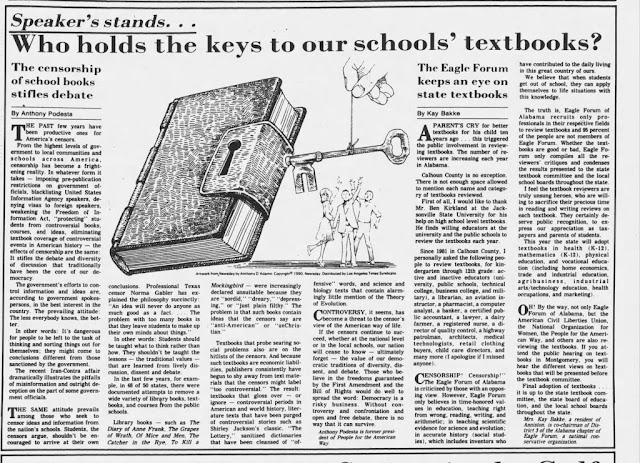1990 School Textbooks: The government’s efforts to control information and ideas are according to government spokespersons, in the best interest in the country. The prevailing attitude: The less everybody knows, the better.
Who holds the keys to our school's textbooks?
The censorship of school books stifles debate
by Anthony Podesta
1990 Sep 6 The Anniston Star
The past few years have been productive ones for America’s censors.
From the highest levels of government to local communities and schools across America, censorship has become a frightening reality. In whatever from it takes – imposing pre-publication restrictions on government officials, blacklisting United States Information Agency speakers, denying visas to foreign speakers, weakening the Freedom of Information Act, “protecting” students from controversial books, courses, and ideas, eliminating textbook coverage of controversial events in American history – the effects of censorship are the same. It stifles the debate and diversity of discussion that traditionally have been the core of our democracy.
The government’s efforts to control information and ideas are according to government spokespersons, in the best interest in the country. The prevailing attitude: The less everybody knows, the better.
In other words: It’s dangerous for people to be left to the task of thinking and sorting things out for themselves; they might come to conclusions different from those sanctioned by the government……
The same attitude prevails among those who seek to censor ideas and information from the nation’s schools. Students, the censors argue, shouldn’t be encouraged to arrive at their own conclusions. Professional Texas censor Norma Gabler has explained the philosophy succinctly: “An idea will never do anyone as much good as a fact… The problem with too many books is that they leave students to make up their own minds about things.”
In other words: Students should be taught what to think rather than how. They shouldn’t be taught the lessons – the traditional values – that are learned from lively discussion, dissent and debate.
In the last few years, for example, in 48 of 50 states, there were documented attempts to remove a wide variety of library books, textbooks, and courses from the public schools.
Library books – such as The Diary of Anne Frank, The Grapes of Wrath, Or Mice and Men, The Catcher in the Rye, To Kill a Mockingbird – were increasingly declared unsuitable because they are “sordid,” “dreary,” “depressing,” or “just plain filthy.” The problem is that such books contain ideas that the censors say are “anti-American” or “un-Christian.”
Textbooks that probe searing social problems also are on the hitlists of the censors. And because such textbooks are economic liabilities, publishers consistently have begun to shy away from text materials that the censors might label “too controversial.” The result: textbooks gloss over – or ignore – controversial periods in American and world history, literature texts that have been purged of controversial stories, such as Shirley Jackson’s classic. “The Lottery,” sanitized dictionaries that have been cleansed of “offensive” words, and science and biology texts that contain alarmingly little mention of the Theory of Evolution.
Controversy, it seems, has become a threat to the censor’s view of the American way of life.
If the censors continue to succeed, whether at the national level or in the local schools, our nation will cease to know – ultimately forget – the value of our democratic traditions of diversity, dissent and debate. Those who believe in the freedoms guaranteed by the First Amendment and the Bill of Rights would do well to spread the word” Democracy is a risky business. Without controversy and confrontation and open and free debate, there is no way that it can survive.
 |
| 1990 Sep 6 The Anniston Star |



Comments
Post a Comment